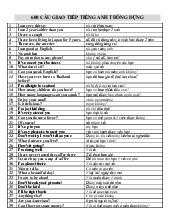







Preview text:
Catalog
6. Public figures private life........................................................................................................3
7. A healthy lifestyle....................................................................................................................3
8. The dating game......................................................................................................................4
9. Why you got married...............................................................................................................4
1. Teenage rebellion. (nổi loạn tuổi thành niên) -
What is teenage rebellion: o
An act of highest assertion of independence and little adherence to parental
advice during teen years of a child’s life. o
It leads to an intense confrontation between the teen and their parents. o
Teenage rebellion may seem spontaneous and illogical for parents, but there
are several underlying reasons behind these behaviour. -
Why do teens become rebellous. o
The desire to be independent:
Teens is something that between being an adult and a kid
The in-between phase causes a surge in motivation to change status quo.
The urge to be independent leads to increased defiance to rules and not obey to parents. o
Heightened differences with parents:
The rules that they have been following to since their childhood seem
to ben suffocating ( Something that is suffocating makes
you feel uncomfortably hot or unable to breathe)
They question the rationale behind such rules and feel that the rules
are curtailing their freedom.
The things that a teen think is cool may be disproved by the parent. o
Impulsive decisions:
Teens are prone to making impulsive choices
A teenager’s judgment can be overridden by the desire to seek thrill
and encounter exciting experiences. It can cloud the discretionary
thought process, which may eventually make them violate rules, and
ignore risks in favor of rewards o Peer pressure
The teenage brain lays greater emphasis on the opinion of their peer
groups so that they can feel a sense of belonging in those groups. A
teen might want to do things to please the peers even if parents are against it. o
A change in the brain structure:
An immature neural structure with the constant change in the brain
design impacts their decision-making, leading to a rebellious behavior. o Hormonal changes
A mixture of hormones pumping through a teenager can cause a
drastic change in the thought process. For instance, the production of
testosterone in boys during teen years is ten times more than what they
once had (1). Sex hormones have a significant impact on the brain
functions and may have effects on essential neurotransmitters leading
to problems with mood and demeanor. -
Positive effects of teenage rebellion. o
Teen can openly express their opinion to parents
A teen is more likely to have a dialogue with the parent to understand
a rule instead of following it blindly. It means you can have some
mature conversation with the teen. o
Makes them be independent in situations
Some rebellions lead to independence for good reasons. For example,
resisting the parent’s help in packing their bags and doing it all by
themselves is a big help to the parents! o
Make a teen feel like a grown up
A healthy rebellion for good reason can make the teen think like an
adult behave responsibly o
Bolster self-esteem:
Develop a strong sense of self and be more assertive and confident. -
How to deal with a rebellious teenager. o
Stay calm: using a polite tone to ask what’s on their mind o
Set appropriate limit
Punishments seem not work the same way as they once did when your teen was a young kid
Don’t slap a teen, lock them in a room, stop them from using phones as a punishment o
Have respectful conservation as a friend
Put yourself in their shoes for a while
Cut down authoritarian phrases (“I am your dad, and I know better so
listen.”), instead use relaxed sentences (“Hey buddy, I am your dad
and know a thing or two more. Let’s have a chat”). o
Explain your intentions
Take the conversation forward and explain how these habits can have
an impact on the lives of teens and even their families. Use examples if needed.
The teenager may better understand the logic behind rules and
instructions if you respectfully explain acquaint them to the negative
consequences of doing things that are wrong.
Most important, take time to listen to their perspective on the situation o
Come with win-win solutions
Discussing the limits with your teen doesn’t mean that you have to bend to their demands
Have a systematic, step-by-step approach to the teen’s rebellion
You take time to calm down the situation
Make space for listening -
how to prevent teenage rebellion o
set firm yet reasonable rules o
have a conversation instead of argument o
have reasonable consequences o praise good behavior o
praise is the best reward but sometimes material rewards can also be used o
give your teen space and privacy o
share knowledge and resources.
2. Neighbor from hell. -
Neighbor (n) the one who lives near you -
Proximity (n) the state of being near in space or time + to -
have coutless arguments with sb over sth -
a building of a new wall between their gardens -
steal several centimetres of land from sb - to sb’s advantages - the laws of property - be on speaking terms -
have a small yapping dog. The dog barks all the time -
constantly yapping day or night - drive sb mad -
the dog barks at her like she is an intruder -
it’s perfectly natural for dogs to bark - ignores any complaint
play music all the time. Loud music
The only time it’s quiet is in the morning
At night, there are very noisy parties. And as Doug tries to sleep before a long day at
work, all he can hear is loud music and laughter next door.
He has complained, and the students apologised. But by the following week, it is back to normal again.
“It is just infuriating,” he says.
These are extreme cases. But it seems that having very difficult neighbours is not so uncommon.
Disputes between neighbours can be a very costly experience too.
In some cases, people have had to sell their homes to get away from the neighbour from
hell. And they may lose money by doing so.
For Doug Mills, he is very grateful that his terrible neighbours are students.
“I know they will leave the house by the summer,” he says. “And I can enjoy some peace and quiet then.”
Reading Comprehension Questions
What two values can a neighbour have?
How is most people’s relationship with their neighbours? Good or bad?
If people have good neighbours, what kind of things do they say or do for each other?
What is the name of the first person mentioned in the article?
What argument does this person have with their neighbour?
What reason or excuse does the neighbour give in their defence? Is the case closed?
Does Paul speak to his neighbour?
What is the name of the second person mentioned in the article?
What is the issue between this person and their neighbour?
Did the person talk to the neighbour about this problem? What was the result?
Finally, what did Irene have to do?
What excuse does the neighbour give for the barking dog?
What is the name of the third person mentioned in the article?
What is the issue with this person’s neighbours?
How does this affect his life?
Have the neighbours said sorry to Doug?
Do some people sell their homes to get away from bad neighbours?
Why is Doug looking forward to the summer? Essential Vocabulary weight in gold enemy cheery uncommon exchange spare keys faith unfortunate countless centimetres advantage principal laws castle yapping to bark constantly to drive sb mad intruder refuses involve lawyer perfectly natural sigh complaints infuriating extreme costly grateful peace and quiet Discussion Questions
Do you have any ‘neighbours from hell’? Tell the class about this person.
What are some common problems with neighbours in your culture?
Has a neighbour ever complained about you? What was the reason?
Who deals with neighbour disputes in your city? Is this effective? Who should deal with neighbour disputes?
Do you have a neighbourhood watch system in your city? Is this a good idea? Why/why not?
Is it acceptable for neighbours to have dogs? Why/why not?
What animals are unacceptable for neighbours to have?
Do you think modern society prevents us from making friends with our neighbours? Why/why not?
There is an English phrase — Love Thy Neighbour. What do you think this means? Is this possible?
Should we even talk to our neighbours at all? Why/why not? making too much noise
leaving rubbish in the wrong place
a pet or animal that causes problems
kids running around and shouting
having loud and noisy parties a nosey neighbour
a neighbour that complains about the slightest thing
a small argument that escalates for years
a disagreement over territory
trees that block the sunlight
borrowing something and not returning it envy over a new car
3. Thing that goes bump in the night.
“Do you believe in ghosts”
Ghost (n) the spirit of a dead person, which appears to living people
Evil spririt (n) a bad ghost
Last night I came across with a ghost. She seemed to be very dejected. She was
weeping. I felt a deep sorrow for her and asked why she was wandering between
heaven and earth. She told me the following story: Quote
I have been wandering since I have given my life to my love. He had the coolest heart,
but there had always been a warm smile on his face. He was handsome. In my eyes he
was prince charming, but he had always filled with gloom. He might have bright life,
but he loved living in camera. I tried hard to know what wrong had happened in his
life, which had made him stone hearted. O’stranger don’t ask who he was, because I
can’t tell you except this that he was my love. I always hoped in my entire life that one
day he will be mine, but that day never came instead I met with an end. Since then I
am wandering. Can you tell me O’stranger how long I have to wait for him, because I
cannot go up there without him? I know you can’t tell me, because you haven’t in love
yet! To understand my pain, you have to let yourself suffer from this pain too. Unquote
No I do not believe in ghosts, but still I will not like to live in a ‘so called’ haunted house. 4. Living longer.
Over the last half century, life expectancy across the world has been rising as a result of better
quality healthcare. This means that today we have an ageing population. On the face of it, living
longer seems to be a good thing – after all, nobody really want to die! – but a decent old age
depends on health and wealth.
Many people in their seventies and eighties, and even older, are able to enjoy a long and
fulfilling retirement. They can travel to new destinations and get involved in a wide range of
hobbies and activities that were impossible while working and bringing up a family. Those with
grandchildren may also be able to help young, busy parents with such tasks as collecting
children from school; moreover, they could share their life experiences with the younger generation. (pros )
But while there are tremendous benefits to increased life expectancy, they depend, to an extent,
on being healthy and having money. Older people are more likely to suffer from medical
problems, especially chronic illnesses like diabetes and muscle pain, which can seriously restrict
the kinds of activities they do. This also means increased health care costs, for both individuals
and society. In addition, if older people aren’t working, they will have to rely on savings and
pensions to pay for their lifestyle, but many older people simply won’t have been able to save
enough for a long old age. (cons)
Overall then, I feel that the benefits of living older are clear, but these must be balanced against
the implications for health and money. If living longer simply means chronic health complaints
and grinding poverty for a longer time, it is questionable as to whether to whether it is an advantage at all.
- be able to enjoy a long and fullfilling retirement - travel new destinations
Get involved in a range of hobbies and activities that is impossible for us while working and bring up families.
- we can also help your children to take care of your granchilden, and they can
contrencate on work and earn money
- As we get older, more experiences we have. So we can share them with people around,
younger generation, it’s amazing
But although a lot of advantages of living longer,to an extent, depend on your health and money
Suffer from medical problems, chronic diseases: muscle pain
Restrict these kinds of activities Increase health cost
Rely on pensions and savings, not every old ones are able to save money for long old age 5. Environment.
the air, water, and land in or on which peopel, animals, and plants live
We say we care about the planet but we continue, if not do worse then what we had previously been doing.
By removing these trees, we are depleting our oxygen supply. But the thing is humans
don’t know moderation. Meaning humans don’t know how to not do things in excess.
6. Public figures private life
7. A healthy lifestyle -
Lifestyle: what you do on regular daily basis - Healthy lifestyle: -
Nutrition: things that suppose to.. - Nutrionist -
Do you live a healthy lifestyle -
What can you do to change -
Hỏi về người đầu tiên- có đồng ý không. - Intermittent fast - Fast (v) -
Balanced diet means you enough carb, protein and fiber, fat - Satured fat - No-carb -
Dissertation(n) bài luận - Black out (phrase) - Anti-depression - Anxiety - Anxiuos -
Vanity (n) things that are unimportant, phù phiếm - Get discouraged -
Take in sunlight, exposure to the sun -
Hormone level, how well you are able to sleep - Make an effort -
Metabolism (n) the process in which your body turn the food into energy -
State of your life, the older... - Chuppy (a) - Metabolic -
Indulge (v) enjoy it too much -
Intuition: listening to your body - Back aching -
High blood pressure - Headache -
Source of comfort - Calm sb down -
Embassy: đại sứ quán - Consulate (n) - 8. The dating game 9. Why you got married -
Greeting before starting the test. -
Summary: workbook (beginning) tóm tắt - Opinions - Explantion -
Vocabulary (họ đưa từ mới- nghĩa là gì/đoạn văn trong sách)




